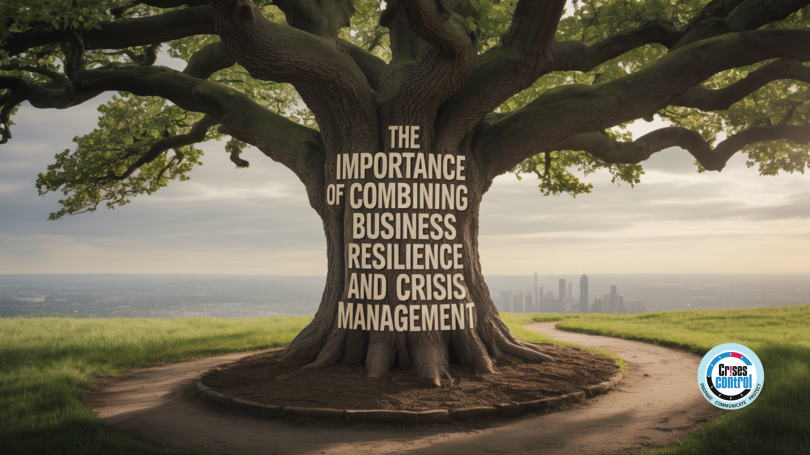What sets apart successful companies from their counterparts in times of crisis? The answer lies in their ability to seamlessly integrate business resilience and crisis management into their core strategies. By combining these two crucial elements, companies can not only weather the storm but also emerge stronger and more adaptable. In this blog, we will delve into the significance of integrating business resilience and crisis management and explore how Crises Control, a leading provider in this domain, can help businesses effectively tackle crises.
Understanding Business Resilience
What is Business Resilience?
Business resilience refers to an organisation’s ability to adapt, recover, and thrive in the face of disruptive events. It encompasses a holistic approach to risk management, encompassing both proactive and reactive measures. Business resilience involves identifying potential risks, assessing their impact, and developing strategies to mitigate them. It focuses on building resilience across all aspects of the organisation, including people, processes, technology, and infrastructure.
The Importance of Business Resilience
Business resilience is vital because it enables companies to anticipate, respond to, and recover from crises efficiently. By proactively identifying vulnerabilities and implementing robust risk management practices, businesses can minimise the impact of unforeseen events. Moreover, a resilient organisation can adapt quickly to changing market conditions, seize new opportunities, and maintain a competitive edge. Business resilience is not just about surviving crises; it’s about thriving in the face of adversity and positioning oneself for long-term success.
Exploring Crisis Management
Definition of Crisis Management
Crisis management refers to the strategic planning, coordination, and execution of actions to mitigate the impact of a crisis. It involves identifying potential crises, establishing effective response protocols, and implementing strategies to minimise disruption and protect the organisation’s reputation. Crisis management encompasses various activities, including crisis communication, resource allocation, and crisis recovery.
Why Crisis Management is Vital for Businesses
Crisis management is vital because crises can strike at any time, jeopardising the stability and reputation of businesses. Effective crisis management allows organisations to respond promptly, effectively, and transparently to the needs of stakeholders, including employees, customers, investors, and the wider community. By having a well-defined crisis management plan in place, businesses can maintain control over the situation, minimise negative consequences, and restore operations swiftly.
The Synergy Between Business Resilience and Crisis Management
Business resilience and crisis management are closely interconnected and mutually reinforcing. While business resilience focuses on building a strong foundation to withstand disruptions, crisis management comes into play when those disruptions occur. Together, they create a comprehensive framework for effectively navigating uncertainties and mitigating the impact of crises.
How Business Resilience and Crisis Management Complement Each Other
Business resilience sets the groundwork for effective crisis management. By investing in risk assessment and mitigation strategies, businesses can identify vulnerabilities and implement preventive measures. This proactive approach helps organisations anticipate potential crises and develop robust crisis response plans. Conversely, crisis management enhances business resilience by testing its effectiveness and highlighting areas for improvement. Through post-crisis evaluations, organisations can learn from their experiences and refine their resilience strategies.
Achieving Effective Business Resilience with Crisis Management
Crisis management plays a crucial role in enhancing business resilience. By effectively managing crises, organisations can minimise the impact on their operations and ensure a swift recovery. Crisis management encompasses various elements, such as timely communication, resource allocation, and continuity planning. These components reinforce business resilience by enabling organisations to respond swiftly and maintain operational stability during challenging times.
Enhancing Business Resilience with Crises Control
By leveraging the robust features of Crises Control, businesses can significantly enhance their business resilience. Let’s explore how Crises Control empowers organisations to effectively navigate crises and bolster their resilience:
Streamlining Crisis Response and Recovery
Crises Control streamlines crisis response and recovery processes by providing a centralised platform for incident management. With real-time incident reporting and efficient communication channels, organisations can quickly assess the situation, allocate resources, and execute predefined response protocols. This streamlined approach enables swift and coordinated actions, minimising the impact of crises and expediting the recovery process.
Minimising Downtime and Financial Losses
With Crises Control, businesses can minimise downtime and mitigate financial losses caused by crises. The platform’s business continuity planning module ensures that organisations have robust contingency measures in place. By identifying critical processes, developing backup plans, and automating recovery procedures, businesses can swiftly respond and restore operations. By minimising downtime, businesses can mitigate financial losses and maintain customer confidence, enhancing their overall resilience.
Strengthening Stakeholder Communication
Effective communication is essential during crises, and Crises Control excels in facilitating seamless stakeholder communication. The platform’s communication and notification system enables organisations to reach employees, customers, suppliers, and other stakeholders promptly and efficiently. By providing timely updates, instructions, and reassurances, businesses can maintain trust, manage expectations, and demonstrate their commitment to stakeholders’ well-being. Strong and transparent communication strengthens relationships and enhances business resilience.
Conclusion
The combination of business resilience and crisis management is vital for organisations to navigate uncertainties successfully. By proactively building resilience and leveraging effective crisis management strategies, businesses can minimise the impact of crises, maintain operational stability, and position themselves for long-term success. Crises Control, with its comprehensive features, empowers businesses to achieve these goals. From real-time incident reporting to robust communication systems and business continuity planning, Crises Control equips organisations with the tools they need to enhance their resilience and effectively manage crises.
By adopting Crises Control, businesses can streamline crisis response and recovery, minimise downtime and financial losses, and strengthen stakeholder communication. With a proactive and holistic approach to crisis management, organisations can thrive amidst challenges and emerge stronger, demonstrating their ability to adapt and overcome adversities. Request a demo to learn more about Crises Control or speak to one of our experts to understand how Crises Control can help your business stay protected.







